#the priest's children
Explore tagged Tumblr posts
Text
I've been meaning to say this for a while, I liked hit priests before fleabag.
There was Carter from harvest moon who was a cutie but this post is not about him.
In the 2013 movie "The Priest's Children", Don Fabijan was like my celebrity crush for a while, I had a whole ass picture of him on my phone (in his priest outfit of course).
Not sure what the point of this post is, just saying Fleabag didn't invent hot priests.
0 notes
Text
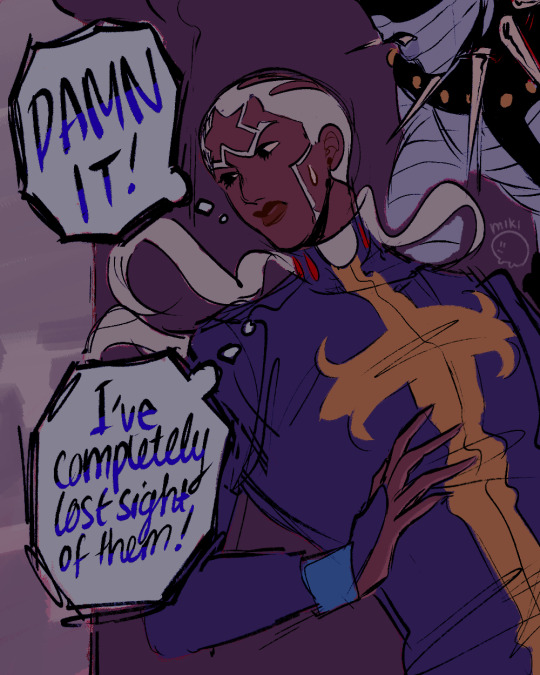
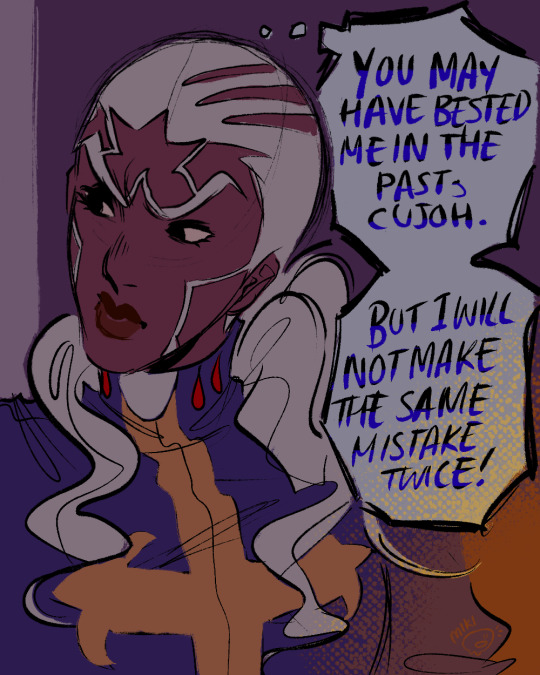


Be kind to your elders, Jolyne 🫂💛
#enrico pucci#jolyne cujoh#foo fighters#foof#f.f.#ermes costello#stone ocean#jjba#fanart#jojo part 6#comic#wholesome#that one au where pucci is just a normal priest that is babysitting everyone's kids because i said so#children's ministry au?#i like that name
2K notes
·
View notes
Text

Stigmata — Hasta'akala
"Oh, no. I believed that God was with me... Do you believe that? Was God with me?"
—The Sparrow, 1996
(I'm like going into space jesuit genre relapse so I decided to feed the fans of a novel that came out 28 yrs ago.... I'm making my mark before they make that damn live action show, which I am terrified of, so I can proclaim my vision)
162 notes
·
View notes
Text

Obviously everyone has their preferences but Reader saying something along the lines of "If you really love me you'll keep it all in, won't you?" Makes me feral
#Loser and Fuckboy Priest Reader just pays that children support bitch ain't catching them#yandere oc#yandere#yandere meme#yandere scenarios#yandere x reader#suggestive#yandere x you#sub yandere
2K notes
·
View notes
Text
Why do we never talk about Forelhost. Why don’t we talk about the fact that Rahgot and his followers holed up in there were literally the dying breath of the Dragon Cult. Why do we not talk about the fact that they fucking Jonestown’d themselves, children included (it even explicitly says so in a note to ‘make room for the children’s bodies’ fucking hello?) That dungeon haunts me every fucking day.
#I don’t remember whether it was a mod or not that did this but iirc you can find children sized skeletons there#genuinely one of the most harrowing places in the game#skyrim#dragon cult#dragon priest#tes
228 notes
·
View notes
Text

• It's that strange child with the priests, who always seems to make a nuisance out of himself •
#Riven#Ascended#///#art#oc#artists on tumblr#Riven grew into awkwardness once he got into his teen years but as a child he was the most polite menace to the other priests aka Shepherds#As children do need to release their energy his grandfather permitted it but he earned the ire of many of other members of the temple
74 notes
·
View notes
Text

(Arena) Shadow Elu. Inspired by Krista Feranka's variant cover for Scarlet Witch vol 2 issue #2.

41 notes
·
View notes
Text


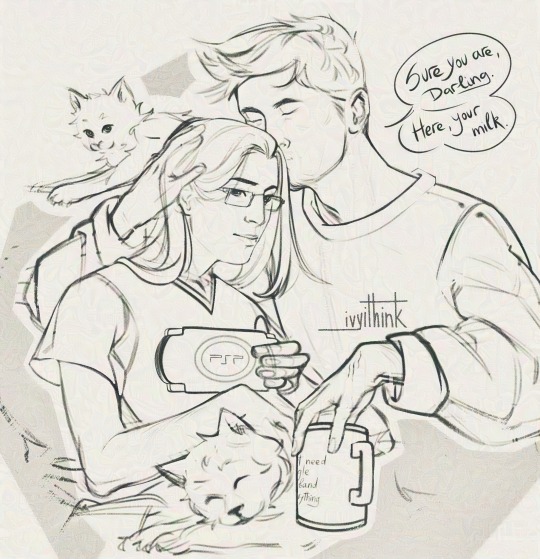
so i’ve finished “mo du”
so, i’ve read “mo du” and it finished me
fei du’s mug! (a gift from luo wenzhou, obviously)

#my art#my doodles#mo du#silent reading#luo wenzhou#fei du#zhoudu#luo yiguo#fei qian#YES KITTIES GET TAGGED THEY ARE THE CHILDREN C’MON#should probably also tag#justice in the dark#the adaptation we will probably never get in full…. and it had such a fun start; they made some real interesting choices; and acting?? GOOD#BUT THE NOVEL#it’s been some time since I last had the feeling of ‘I NEED to read all of this RIGHT NOW#but also I desperately don’t want this book to end’#this one was such a ride and I loved every second of it#goddamn priest did it again#she got me good with guardian and word of honor (although I’ve only watched those for now)#AND THEN THIS!?!#she’s insane I love her#and I love these two well technically four#you can’t forget the cats#especially when one of them is legit a proper character#I swear I’ve seen/read actual human characters — some of them main ones — that had less personality than that cat#and yes I did choke on air upon witnessing with my own eyes fei du’s ‘I’m the abyss’ speech#WHO ARE YOU?#KANG YOHAN???#these dramatic bithes honestly#would die for them
380 notes
·
View notes
Text
catholic jason is like
random: wanna have sex?
jason: sorry i'm waiting until marriage
random: you literally kill people
jason: and? that's between me and my god
#has this been done before#''jason isn't a virgin'' consider that i find it funnier to think he is#he's just an awkward guy who everyone flirts with and he awkwardly flirts back but when they ask him back to their place#he's just like uhhhhhh 😅😅😅 i thought this was for funsies#headcanon that he goes to church after killing a bunch of fuckers and the people are like ''omg father who is that should we call the cops''#and the priest and nuns are just like oh no that's jay he's the sweetest boy around! an absolute delight who all the children love :D#jason: *sitting there bleeding out on the pews* :D#jason todd#red hood#dc#jason todd headcanon
80 notes
·
View notes
Text
Okay, so! I think the way adding the Coachman into Playful Land can work is if the Boss/Coachman is a Chort faerie.
(Leaning more towards Slavic faerie Mythology here)
One who is often trying to trick others into selling their souls in exchange for something, and who often has to be tricked in order for the gambler to win back their soul. A Chort is often a smallish hairy man with a tail, horns, and hooves, but he is a shapeshifter who likes to trick people with a prettier appearance before they figure out what he is. The transformation is impossible to perfect, so he can be figured out by small horns hiding in his hair or by having a hoof hiding in his shoes. (The Coachman in Pinnochio has the tips of his ears hidden, so that could be a sign too that the "Boss" isn't human as it's hiding the "points" of his ears. He also makes this obviously demonic face when he scared Honest John and Gideon.)
Anyways.
Fellow, Gidel, and the "Boss".
Fellow is already fed up with his boss, but in this version Fellow does not have the magic to reverse the puppet transformations. Thus, the "Boss" probably threatens Fellow that if he doesn't do a good enough job he will not only not get paid the massive amount of money that was promised, but the "Boss" will also turn Gidel, Fellow's little brother, into a puppet using his magic despite Gidel not breaking any rules. Unfortunately, Gidel ends up attacking the staff puppets in an effort to stop them from leaving- and because in this version Fellow does not have the power to stop the transformation- he's forced to watch as his little brother falls to the ground with a wooden mask appearing on his face.
He has no choice but to work with Ace, Ortho, and Kalim now.
But where is the "Boss" hiding? Fellow doesn't know. He was never given that information. Ortho most likely has to do a quick sweep and scan of the entire park scanning for signs of life before the NRC boys realize they're on top of a whale, the ship is a whale, the amusement park is on a freaking whale, and that there's someone hiding in the whale's mouth because Ortho probably did a scan focused solely on the whale, including an X-Ray, which revealed the person's presence. Fellow is stunned, because while he knew the ship was a whale he never imagined the "Boss" could be hiding in it.
Now, how the frick do they get inside the whale?
The only way to get inside a whale, since the blowhole isn't actually connected to the whale's mouth (they'd just end up in the poor beastie's lungs in they tried) of course, is to be eaten. They'll have to get the whale to open its mouth and let them in. Fellow probably comments that it's almost feeding time for the whale, since it eats like twice a day, so it'll be rising up soon. Everyone is startled, but Fellow reveals he was expecting all the students to be puppets by now so he didn't think much about it.
Ortho probably has to carry Fellow while everyone else finds a broom to fly themselves into the whale's mouth.
There they discover a young beastman boy, dressed in a sweater vest and tie, looking very much like a student from a private school. Dark hair, a cute face, and a little donkey tail with matching ears, acting so terribly frightened, claiming he was swallowed by the whale when he jumped off the "ship" trying to escape after all his friends were turned into puppets. He's just so relieved he's not the only one here anymore, and that maybe if they all work together they can escape the whale and avoid the curse.
Kalim buys into the act immediately, Ace and Fellow are suspicious, but Ortho is the one who calls him out on it. (Ortho really be the MVP here, huh. Sorry, Kalim. T_T)
They end up battling, Fellow using his magic to inspire everyone and keep their morale up, while the student transforms into a not-so-pretty older faerie, revealing himself to be a Chort and Fellow's "Boss", and shows expert skill in wood/plant magics. The curse can't reach them inside the whale, as the spell was casted on the amusement park itself, so they can be as violent as they wish, and while Ortho is blasting away all the wood Ace and Kalim manage to work together and take the "Boss" down.
Afterwards, Kalim uses fire magic while Ace spreads the fire with his wind magic to make the whale sneeze them out, and through some struggle (Fellow riding with Kalim while Ortho carries the bound "Boss" with him) they manage to get back to the amusement park where all their friends and the dying Eleanora are being held in cages.
The Chort removes the cursed masks from them via threat of obliteration in the sky by Ortho, who is all too willing to commit murder as we've seen from various story and vignette moments, and Fellow takes command of the park after reuniting with the now-saved Gidel and turns the ship back towards Sage's Island.
Everyone is pissed, Lilia and Ace are fussing over Eleanora who is unconscious because girl can not have a curse overlapping the curse she already has and is recovering from being on death's doorstep, and everyone goes off on Fellow before taking turns beating up the "Boss" because they're twisted from villains and are petty and have grudges and very much did not appreciate nearly becoming living puppets while watching someone they were friends with/classmates with DIE SLOWLY IN FRONT OF THEM, that shit is traumatizing yo.
And then they wreck the amusement park and drag the "Boss" to the school because they don't really trust Hilltown's authorities to handle a faerie as dangerous as the "Boss" and thus get Crowley, Divus, Poma, Sam, Trein, Vargas, all of the staff, involved, as well as Malleus Draconia as he is the prince of the nocturnal fae and may have information on what all the "Boss" is capable of.
Of course, this does mean he finds out what happened with Eleanora, especially since girl is probably still unconscious and Lilia was likely carrying her, so drama (particularly of the political kind) will most likely ensue.
Basically, Malleus will have to make a decision.
Either deal with the Chort himself and make a formal complaint to the faerie kingdom the "Boss" is from to ensure this kind of thing never happens again to Eleanora, contacting his grandmother for help and letting his relationship with her be known to the public, thus risking getting the Senate involved and unleashing all sorts of danger and drama unto her far earlier than originally planned with little to no preparation against their cruel antics, leaving his grandmother to deal with the worst of the backlash from the Senate and try to buy them time, or let the teachers and authorities handle it and risk Eleanora getting cursed again- which may potentially end the Draconia line as dragons can only be born and hatched through true love, as without Eleanora, Malleus' true love, who he was planning to marry after graduation, there will be no more Draconias.
Either way, her life will be endangered.
By the foolish Senate who believe a human is unworthy and will only taint the noble Draconia line (Maleficent and Ellis, anyone?) and thus will try to get rid of her, which will just end the Draconia line anyway, because they'd rather risk extinction than let a human into the royal family, or by those as foolish as the Chort who would dare try to curse her and end her life. (Granted the "Boss" wasn't expecting her to start dying, he just thought she was going to be another living puppet until Fellow was like, "Erm, yeah, no, one of the puppets are dying, Boss" but anyways.) It's very much a "pick your poison" and which is the lesser evil.
Also all the dorm leaders and vices who weren't involved find out what happened, and Ace, Cater, and Trey end up sharing a four hour lecture from a very mad Riddle but they get away without any further punishment because they've pretty much already had their punishment. Idia has a near heart attack when he finds out what Ortho went through.
And, depending on Malleus' decision, the Chort is either handed over to the Valley of Thorns or to the authorities of the kingdom that the Chort faerie is from.
BOI THIS WAS A MOUTHFULL, HAAAAAAAH. HOPEFULLY IT MAKES SENSE.

#fun fact. Chorts are considered children of Chernobog in Slavic mythos. in Ukrainian they're his priests.#twst#twisted wonderland#fellow honest#twst gidel#ernesto foulworth#stage in playful land#twst fellow#ace trappola#ortho shroud#twisted wonderland oc#pinnochio#playful land's miraculous marionettes#twst event#twst spoilers#twisted wonderland spoilers#malleus draconia#malleus draconia x oc#eleanora quince#lilia vanrouge
35 notes
·
View notes
Text





























#Warhammer#Warhammer 40000#Chaos#Chaos Marines#Deathguard#Death Guard#Red Corsairs#Thousand Sons#Black Legion#Emperor's Children#World Eaters#Daemons#Nurgle#Tzeentch#Khorne#Slaanesh#Chaos Knights#Imperium of Man#The Imperium of Man#Adeptus Mechanicus#Tech Priests#Skitarii#Space Marines#Dark Angels#Ultramarines#Deathwatch#Death Watch#Grey Knights#Raven Guard#Blood Angels
16 notes
·
View notes
Text
Trigun and Christianity

In lieu of trigun Stampedes choice to make Wolfwood an undertaker instead of a priest (to, well, my disappointment), I thought it might be interesting to look at some of the Christian themes in Trigun, and then also look at why they might have decided to choose for Wolfwood to be a undertaker then a preist, and a potential reason to why Trigun has these Christian themes. Also, btw, this is chock full of manga spoilers so, beware!
To start it off... trigun is actually... pretty heavy on Christian themes. Fuck man, the main character is basically an angel, and in one of the first volumes they literally describe the plants as something divine (although they are later declared to be something humans made... But nevertheless the very clear imagery is there). Also what features very strongly is pacifism and the themes of unconditional love; Vash's refusal to kill coming from believing that going forward, anyone can change, even when he is literally being harmed or attempted to be killed by others. These themes of pacifism and unconditional love are very Christian, and Vash's actions very much centre him as a Jesus-like character. In fact, even the way that he (and knives) was born, a virgin birth, also could be seen as an allusion, as well as the way that he holds a physical form as a human while being more than human- Jesus being considered a 'son of man' while also being the son of God; ie, something in-between, something both divine and human. Knives as well is written in that angelic and divine light, although he is done so in a dark opposite of Vash, with an emphasis on his 'divinity' for imagery as he is obsessed with it. Interestingly, contrast to Knives, Vash, who goes around as a human, is multiple times called a Devil for his reputation, although he is the one that actually is virtuous... This in a way also alludes to him as a Jesus-like figure, as that Jesus was ultimately sought after by the authorities and in some places hated and even driven away by people.
12 disciples
As well, Nightow is pretty blatant that the gung ho guns, of which there are 12, is a allusion to the 12 disciples; hell, Wolfwood calls them straight up disciples when he is at Jeneora Rock. One might argue that then whether that posits Knives as a Jesus figure as that they follow Knives directions, or if one would consider Vash to be the Jesus figure, as the 12 literally seek out, and 'follow' Vash, and of which one of them literally betrays (although, technically, Wolfwoods betrayal goes both ways). However, I don't think that argument is really one that matters, as it's more of the aesthetic of Christianity that Nightow likes in this matter, not the philosophical implications.

As well, as mentioned above, Wolfwood is very Judas-coded; he gets close to Vash, only to inevitably betray him and deliver him up to his fate, while clearly being torn up about it. Vash is not surprised at all when Wolfwood tells him that he was one of the gung ho guns, and you get the sense that he knew about it all along, and knew exactly what he was walking into. Yet he still loves and forgives Wolfwood for all of it. Which... is exactly the same thing that occurs between Judas and Jesus, Jesus willingly going with Judas even though he knew what lay before him.
Wolfwood
As well, quite obviously adding to the heavy Christian themes of trigun, is that Wolfwood calls himself a priest. Although indeed it's part of his front, it's clear Wolfwood in the manga is religious, challenging and calling upon God in response to seeing the Knives born, and his response to the fifth moon incidence where he questions if it was the hand of God (which, actually, is caused by Vash's hand... again alluding to the 'divinity' of Vash and Knives). This clear religious affiliation continues through the series, such as when he is rescuing Vash from Knives, and even praying while he is on the ship with the people that helped vash.
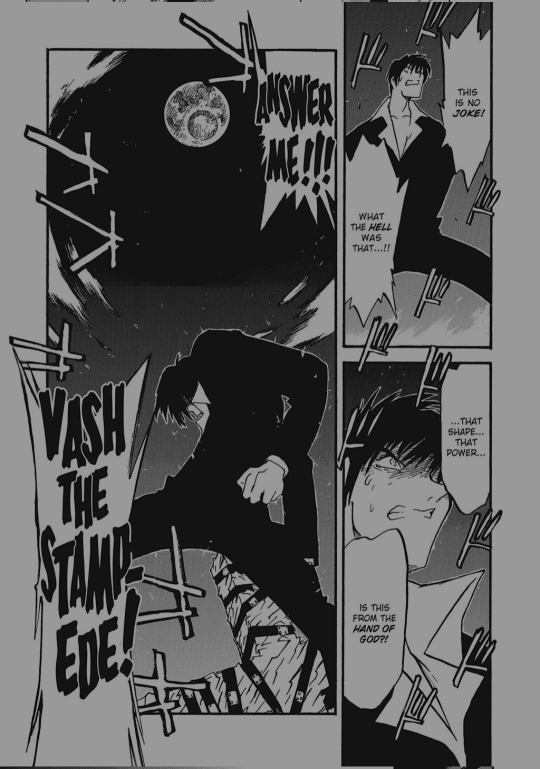
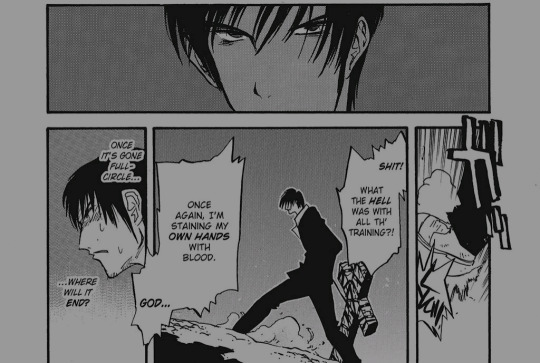
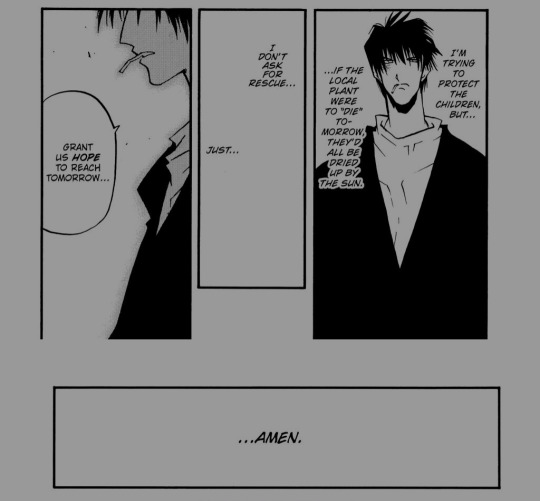
Wolfwood also throughout the series is very clearly is morally wraught with guilt over his choices and sins... Something that's very Catholic/Christian. Hell, the fact that the punisher, the insignia of his murderous profession, is a literal heavy cross that Wolfwood carries with him, is poetic irony; he's literally carrying around the embodiment of his sins and his guilt from his profession and choices, which weighs both heavily on his physical body but also him emotionally. Wolfwood's guilt over his sins and choices comes to its climax when he's about to die when rescuing Vash from Knives, after betraying him; where he questions whether he can be forgiven for what he has done and whether he was wrong, and in response Vash saves him, declaring that he is not wrong; not wrong to go against orders, leaving his vocation of being a murderer behind, in trying to save Vash and moving forward. In declaring Wolfwood that he was not wrong, what Vash (heavily implied divine, Jesus-like character) is declaring is that Wolfwood can be forgiven for his sins, is already forgiven for his betrayal (unconditional love, anyone?), and that Wolfwood can change, that his past doesn't define him, because his future is also a blank ticket.
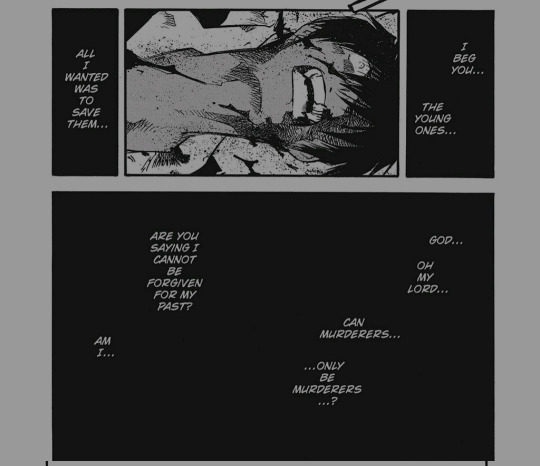

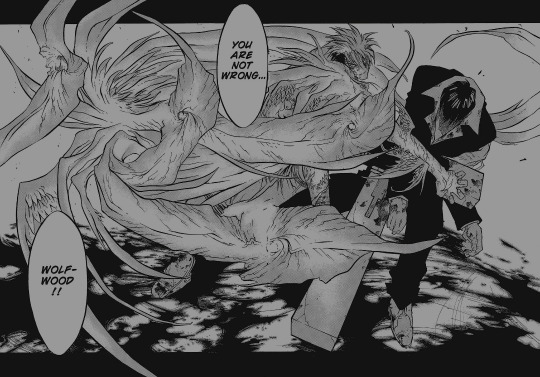
As well, this is followed up later by Wolfwoods confession to Vash that he hates killing:

The confession and the way he phrases it- seeing all humans as his brethren (although, in this sense he may be speaking tangentially about Livio) is something that also has Christian overtones. (Also, the way that they mention Vash sees the whole of humans as his relatives, also ties into that; except personally I'd argue that's more of a Indigenous view then a Christian, but theres plenty of things that overlap with other theologies and philosophies within the manga that aren't just characteristics of Christianity).
Redemption via acts
There's also a theme of redemption via acts, which both Wolfwood and Vash lean into heavily as a result of guilt from their 'sins', something that is very... Well, again, Christian, especially Catholic. Vash, from being unable to stop Knives and having obliterated July and just his and knives general existence, and Wolfwood from his profession, and so they both struggle with immense feelings of guilt. As a result both are very self-sacrificing; Vash very obviously so throughout the series, and Wolfwood in a quieter way, in choosing to continue to work to protect the orphanage, even though he desperately wants to escape the life he leads and hates killing people. They both don't believe they deserve to be loved because of the weight of their sins, and so they redeem themselves the only way they know how by self-sacrifice; this literally causing Wolfwoods death as he didn't reach our to Vash for help, and is evident in the way Legato looks at Vash at the end and realizes he sees a man that only sees himself as a tool and hates himself. This belief of Vash's that he doesn't deserve love/nice things is something that is also interesting, because he so aggressively pushes the 'blank ticket of the future', ie, unconditional love, while clearly being unable to apply it to himself.
Tldr: the point is, Trigun is very heavily Christian themed, both in aesthetic and philosophy, and the characterization of both Vash and Wolfwood reflect that. The show is rampant with such Christian philosophical themes as unconditional love, sin and guilt, confessions, forgiveness and redemption through self-sacrifice; for aesthetic ones, well, literal 'angels' as main characters, Wolfwood being a priest and carrying a cross, the 12 gung ho guns as 12 disciples.
Wolfwood as an Undertaker
Since Trigun is so heavily Christian themed, it makes it... well, a bit of a strange choice to pull the fact that Wolfwood is a preist out, since him as a preist further emphasizes the moral quandries within the story and the themes of sins/guilt/forgiveness and unconditional love. However, as one other post here on tumblr mentioned, stampede as an iteration of trigun is more directed towards a more modern and Japanese audience, some of which can be seen with the revamp of the character designs to make them more relatable, and I think they mentioned some specific character traits with Meryl. This re-vamping, especially one specifically for a Japanese audience might explain why Wolfwood becomes a undertaker instead of being a Christian priest. Nightow in the back panels in the manga is clearly is very enthralled with American culture- and his knowledge and love of the American genres shows pretty strongly in the themes and the setting for Trigun. In fact, the 1998 anime was better recieved in the west then in Japan, and a possible likelihood for it's higher popularity within the Americas is going to be directly because of the western audience being more familiar with the Western genre, as well as specifically, the Christian themes within the show (since western countries cultures are Christian based, even if one wasn't raised religious). As well, compared to the other typical gunslinging space western anime, Cowboy bebop, Trigun contains more Christian themes, which would make it less relatable, and less popular to the Japanese audience (of course there are many other differences in the shows, so I would be reluctant to chalk it up to just the religious themes in trigun- hell, Cowboy Bebop makes some great criticisms of capitalism that is not present in Trigun). Circling back to them revamping the show, if they are trying to make it more relatable to a Japanese audience, then removing more overly American influences, such as one of the characters literally being a Christian priest, would fit that bill quite well.
Trigun and Christianity... Why?
Also, I personally think that Nightow didn't exactly mean to make a story that is really heavily Christian themed. My sneaking suspicion from reading chapter 0, is the Nightow thought that writing a western with a main character gunslinger that is a pacifist would be a fun and interesting prospect, and then when he began to elaborate on it, he began to pull in more western (both cultural and genre wise) themes and aesthetics into the story, resulting in something that is very heavily Christian themed in the end.
EDIT: it's been raised to my attention by the lovely @trigum, that it says in the wikipedia on Nightow that he was raised buddhist and converted to Catholicism, although there is no source for that information. If so, this would, well, very obviously explain why Trigun is so heavy on Christian themes and negates the paragraph above. I'm not giving him enough credit then, my apologies Nightow!
EDIT 2:

Edit 3 (Feb 3): made a somewhat part 2, specifically looking at the phrase the 'bride of Christ'.
#trigun#trigun spoilers#trigun maximum#trigun anime#trigun 1998#trigun stampede#wolfwood#nicholas d. wolfwood#vash the stampede#knives millions#feels wierd to write about Christianity#uh. yeah if thjs is incoherent please ignore me hah#also not to say that trigun is a very Christian bit of media but also??? it kinda is?#as ex christian the amount of guilt coming off these characters is so v me in middle school figuring out im queer#also sad about wolfwood not being a preist for both poetic irony but also. let's be honest that poetic irony is hot#also like. nightow best charcter design ever. sorry no one will be able to design a better character then trained assasin priest#who carries a huge cross machine gun and is full of guilt over his sins#and loves children#is this also tangentally vashwood#yes. ignore me#vashwood#if ur like ur writing is rambly sorry! i know a bit of it is repetitive#do i care? nope not any more#nightow slapping both vash and wolfwood: these boys can fit so much christain guilt in them
481 notes
·
View notes
Text
okay im not in the enstars circle much lately but i would like to express my confusion at and let everyone know of the fact that yt recommended me a song that was basically tatsumi dueting with people confessing their sins or troubles or whatever to him
#fandom spamdom#note's notes#enstars#ensemble stars#guys i dont know whats going on here anymore#i just see these children being tiktokers and eichi still being a conglomerate and now tatsumi singing like some....#...theme??? for his podcast about being a priest#like genuinely the psychic damage and yet the pull#THE PULL and need to know more....#i cant really get back into enstars but afjsiodjfiwoejrwiere#also tatsumi youre going to get excommunicated by the catholics.....#though i DID hear the catholics recently made a little anime mascot which good for them!! (this part is at least sincere)#the power of god and anime etc
15 notes
·
View notes
Text
Anyone else realize the Ascendance of a Bookworm novels are Sailor Moon fan fiction? Look at the gods. You see who I see?
#Ascendance of a Bookworm#things I have been mulling over#Sailor Moon and Tuxedo Mask? Gods of Light and Darkness#Sailor Scouts? Their 'children'.#Chibi Moon is the goddess of earth.#That unicorn priest is the god of Life.#Like#it's all there!#Even the pose used in art is like Sailor Moon and Tuxedo Mask!#The chaos goddess? Look at the story arcs!#So Good!
14 notes
·
View notes
Text
No longer as into rtc and legoland as I used to be but tbh I will always die by my silly nonsensical headcannon that Tammy & Noel are half-siblings
#I also think it would be fun if Tammy's father was a priest#but I don't think catholic priests are allowed to get married and have children#also I cannot imagine Noel ever having a priest for a father#ride the cyclone#rtc#legoland
19 notes
·
View notes
Text
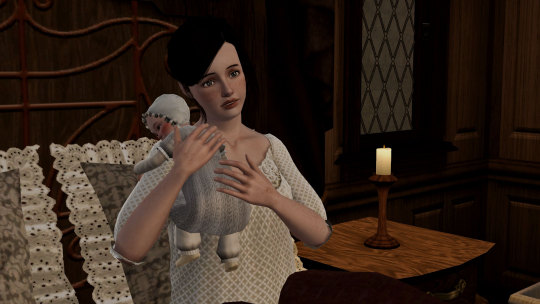
Alice: Well, we must hope and pray for the best. But to think that this very moment my husband is somewhere in France among heathens!
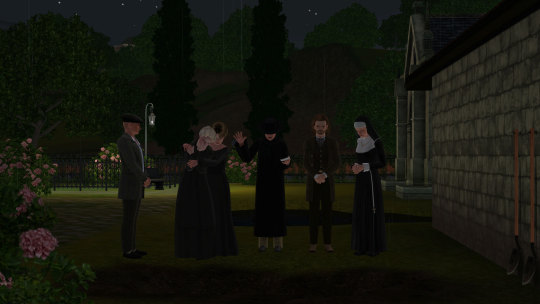
#mccarric scenes season4#mcc4 part2.2#the guy to the left is the farmer who hides the priest#I figured they'd need him to help dig the grave#André and the children are at home looking after each other
46 notes
·
View notes